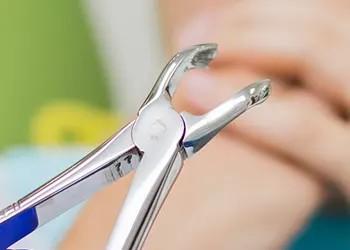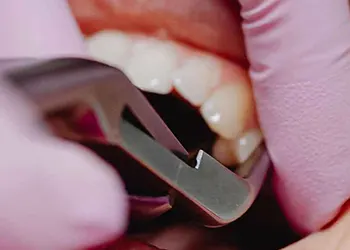Extractions
A dental extraction, also known as a tooth pulling, is a dental procedure that involves removing a tooth from its socket in the jawbone.
What are Extractions?
Extractions straightforward operation that involves the removal of teeth. To numb your sensations, you will be given local anesthetic before extractions.
Surgical Extractions are more demanding operations that require the dentist to expose more of the teeth surgically due to the difficulty of tooth removal.
Local anesthetic would be given to numb your sensation prior to extraction and please inform your dentist if you are on blood thinning/ anti-coagulant medication so that they can advise you accordingly.
As this is a surgical operation, treatment cost is Medisave claimable.


What are the benefits of Extractions?
Pain Relief
Extracting a severely decayed, infected, or damaged tooth can eliminate the source of pain and discomfort.
Improved Oral Health
Removing a problematic tooth can prevent the spread of infection to surrounding teeth and gums, promoting better overall oral health.
Enhanced Aesthetics
In some cases, tooth extraction can improve the appearance of your smile, especially if the tooth is severely damaged or misaligned.
Improved Bite Function
Extracting a tooth that is interfering with your bite can improve chewing and speaking function.
What are Extractions like?
The experience can vary depending on the complexity of the extraction and your individual response to the procedure. Your dentist will do everything possible to ensure your comfort and a smooth recovery.
If you experience any unusual symptoms after a tooth extraction, such as severe pain, excessive bleeding, or fever, contact your dentist immediately.
Here's what you can expect during the process:
Before the extraction, your dentist will numb the area around the tooth with local anesthesia. In some cases, sedation may be used to help you relax during the procedure. The dentist will then use dental instruments to loosen the tooth and remove it from its socket. After the extraction, the dentist will clean the area and apply gauze to help control bleeding.
Post-Extractions Care
After a tooth extraction, it’s normal to experience some discomfort, swelling, and bleeding. Your dentist will provide you with pain medication and instructions for caring for the extraction site. It’s important to follow these instructions carefully to ensure proper healing.
Tooth extraction might seem drastic, but it's often a crucial step towards a healthier, happier smile. Whether it's to eliminate the pain of an infected tooth, pave the way for orthodontic treatment, or improve the fit of dentures, extraction can be a game-changer. While it may seem daunting, tooth extraction can be a necessary and beneficial step on your journey to optimal oral health. Schedule Your Visit to learn more.
Frequently Asked Questions About Tooth Extraction
How is the pain managed during the procedure?
Your dentist will administer local anesthesia to numb the area, and in some cases, sedation may be used for relaxation.
What can I expect after the extraction?
Discomfort: Some discomfort, swelling, and bleeding are normal.
Pain Medication: Your dentist will prescribe pain medication and provide post-operative care instructions.
Dietary Restrictions: You may need to follow a soft food diet for a period.
How long is the recovery time?
Recovery time varies depending on the complexity of the extraction. Most people can return to normal activities within a few days.
You should avoid hot liquids, hard or crunchy foods, and smoking for a period to allow the extraction site to heal.
How It Works
Schedule Your Visit
Choose a clinic location that suits you. Our friendly staff will arrange an appointment at your convenience.
Personalized Consultation
Enjoy a thorough consultation with our experienced dentists, who will discuss your dental goals and create a tailored treatment plan.
Experience Quality Care
Receive top-notch dental care in one of our welcoming clinics, ensuring your comfort and satisfaction every step of the way.